SELMA’s first year
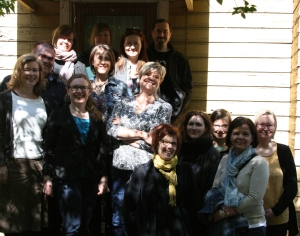
It has been almost a year since SELMA was established in Turku. Throughout the Spring 2015 we had been gathering into discussions together with Hanna Meretoja, Kirsi Tuohela and Päivi Kosonen, and discussed our mutual interests concerning life-writing, autobiography, creativity and the idea of establishing a lively, new kind of context where we could develop ideas around these topics. The times in the academia were not then, as they are not now, easy and welcoming to new kinds of initiatives in the humanities aiming to get funding but we had a nice support from our School and Faculty and we could thus move on with the plans.
On the 4th of June SELMA was officially launched at the international conference Ethics of Storytelling at our School. The reception was enthusiastic both within the international scholars as well as among our fellow colleagues at our School. In September, at our launching workshop, there were 30 presentations from various disciplines at our School discussing on cultural memory, narratives, biographical research, autobiographical research, ethics, and such concepts as trauma and experience.
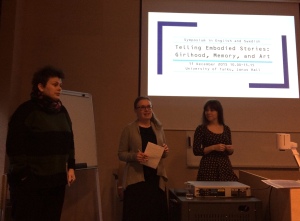
During December we organized a symposium together with IIPC (The International Institute for Popular Culture), FlickForsk! Nordic Network of Girlhood Studies, Tyttötutkimusverkosto (The Finnish Network for Girls’ Studies) and the Department of Cultural History to foster SELMAs interest to the overlapping borders of research and artistic creativity. In Telling embodied Stories we experienced speeches and performances from musicians, writers and scholars dealing with the questions of girlhood, remembering, art and embodiment.
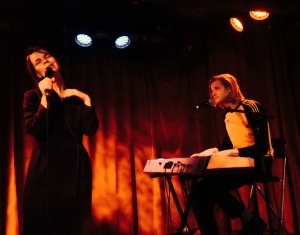
We were thrilled to have as our quest the Swedish-Finnish artist and musician Anna Järvinen, who presented us a prose poem “Det var inget”, that captured memories of being a girl, and experiencing girlhood in relation to other people around you. Anna Järvinen also gave a gig later in the evening with Tapio Viitasaari, and musician and cultural historian Kimi Kärki from Turku performed with his own acoustic folk material together with PhD-student from musicology Anna-Elena Pääkkölä. During this event the open and free mind of SELMA started to show its possibilities as we all were excited about the new possibilities that creativity, artistic contributions and scholarly discussions could contribute together.
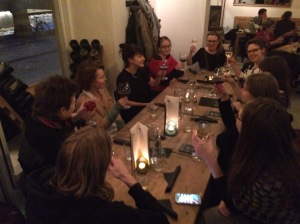
Later in December Hanna Meretoja and Maarit Leskelä-Kärki visited two fellow institutes in London, the Centre for Life-Writing Studies at King’s college and Centre for Narrative Research at the University of East London. We are aiming at finding possibilities of launch various research and other activities with these centres in the future.

During Spring 2016, we launched monthly SELMA seminars, that have run mostly in Finnish, but are open to different kinds of initiatives from abroad as well. We have got to know each other more as we come from various disciplines. In January we started our work with the idea of a project concerning refugee crisis and the life-stories of those seeking asylum from Europe and Finland. Students from the Department of Creative Writing presented us their collaboration with asylum seekers in Turku, and we discussed those many ethical and methodologically challenging questions related to this. During Spring this project has been moving forward, and in June at the Aboagora we are bringing this project to public discussion. In February we joined together to discuss the uses of photography therapy and the possibilities of using visuality in our research as well. In April, the active participants of SELMA from the Department of Nursing Science presented some of their research, and we discussed about the differences in the methodologies and practices of the humanities and medical sciences, and planned future possible collaboration that SELMA could offer.
We have also been discussing our central concepts during the Spring time. Professor of Finnish Literature Lea Rojola presented her thoughts on the concept of experience based on her research on the Finnish modernist writer from the 1950’s and 1960’s Marja-Liisa Vartio. In May, literary scholar and literary therapist Päivi Kosonen gave a thorough presentation on the concept of autobiographical memory based on the thoughts of Antonio Damasio, Celia Hunt, Kirsti Määttänen and Jens Brockmeier. On the same occasion, doctoral students Heta Kaisto and Katja Lautamatti from the School of Arts, Design and Architecture at Aalto University, presented their multidisciplinary research project “Hysteeriset oireet” (Hysterical symptoms) that aims at discussing on the cultural memory of the 1918 civil war in Finland.
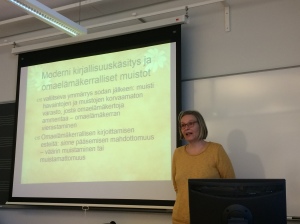
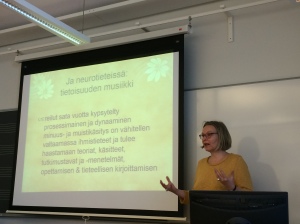


At the moment, SELMA looks eagerly to the future and has started to plan the next academic year. Please, join us by following us, affiliating your research to SELMA and offering new initiatives to continue building our centre.
